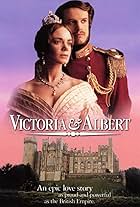In 1936, Edward VIII abdicated in order to marry the woman he loved, Wallis Simpson, a twice-divorced American. These events caused a scandal around the world. Wallis and Edward is an attemp... Read allIn 1936, Edward VIII abdicated in order to marry the woman he loved, Wallis Simpson, a twice-divorced American. These events caused a scandal around the world. Wallis and Edward is an attempt to portray the romantic aspects of the story from Wallis's point of view. The drama foll... Read allIn 1936, Edward VIII abdicated in order to marry the woman he loved, Wallis Simpson, a twice-divorced American. These events caused a scandal around the world. Wallis and Edward is an attempt to portray the romantic aspects of the story from Wallis's point of view. The drama follows the beginning of their affair whilst Edward was Prince of Wales and Wallis was still m... Read all
- Director
- Writer
- All cast & crew
- Production, box office & more at IMDbPro
Featured reviews
Well, the publicity says there's more of Wallis's side of the story here, but I can't say that's obvious, apart from there being a bit more of Wallis' Aunt Bessie (Miriam Margolyes). Edward is portrayed as the seducer (in a candlelight chalet in winter) but Wallis (nicely played by Joely Richardson) doesn't exactly play hard to get. She had rivals for the post of prince's mistress (Lady Furness and Mrs Ward) whom she easily defeats. At the end she was left with the baby, or at least the immature prince, a duchess without honour exiled to France. Stephen Campbell Moore is about 10 years too young for Edward but his puppy-like demeanour is appropriate. The triviality of the Windsors is shown by the fact that it wasn't the loss of the Crown that irked them so much as the establishment's refusal to give Wallis the title "Her Royal Highness". Diana, of course, had exactly the same beef, but then she was demoted on her divorce. Camilla (for the moment) is a mere duchess, but is also "HRH". Winston Churchill, robustly played here by David Calder, was a principal supporter of Edward just because he was a prince, but then Winston was a rather romantic old Tory.
Nazi sympathies were not uncommon in the British upper classes prior to World War 2 ("those Nazi chappies certainly know how to make the trains run on time") but if an invasion of Britain by Germany had been successful (and it was a closerun thing), Edward, given his sympathies would have been the front-runner for puppet King. Edward was an undistinguished governor of the Bahamas between 1940 and 1945 but the main reason for that appointment was to keep him out of the reach of the Nazis. (Down under we got his younger brother, Prince Henry, who was even dumber than Edward, as GG (1942-1945), but a bit better behaved). After that he and Wallis spent the remaining 27 years of their marriage in very comfortable and well-deserved obscurity in Paris. One is left with the feeling we got lucky.
This production has a nice sheen to it and the 30s' era is well evoked. There are some other good performances, particularly 80 year old veteran Richard Johnston as Wallis' nemesis, prime minister Baldwin, and Julian Wadham as Edward's not exactly loyal private secretary Fitzhardinge.
There is a deft touch running throughout: the abdication crisis could have been played in a grinding and maudlin manner but it is handled summarily and almost underplayed.
What particularly convinced was the abdication speech, in the context of the film this "historic given" rang absolutely true. Quite an achievement.
However, it is still a made for TV biopic - the historic characters are necessarily painted a little bland and it is inescapably "light entertainment". There is much humour and subtle-digging at the royal family - but not without affection. Altogether, this film is far better than one could have reasonably expected and far more enjoyable too.
There is some hint towards the end of the narrative, of the sadness of the life of exile that the Windsors led, but that is a whole other movie. There are clear resonances in the movie of Camilla and Charles - I think this is deliberate for the contemporary audience but not overstated. Some of the historical context was a revelation: Churchill considered forming a King's party to champion the cause of Edward and Mrs. Simpson i.e. by no means was the whole county in favour of abdication.
When all is said and done, the story is a real life tragedy out of the Shakespearian mold, and one worthy of the retelling. My mother was at a girls' school at the time - and the whole class listened to the abdication speech in tears. The hold of the story at the time was intense as that other Shakespearian tragedy in our times of Diana.
Wallis Simpson was a woman of questionable character and a chequered past. The suggestion bandied about that she had been a whore in a Chinese brothel, was I'm sure pure fiction, but the feeling that (as quoted in the film) "there's no smoke without fire", gave impetus to the general consensus of the day (although there was a certain popular sympathy with Edward's predicament), that the woman of his choice should not become queen.
Although obviously not as black as the media of the time painted her, she was certainly a woman of the world, and I don't believe for a moment that she hadn't really got designs on becoming Edward's consort. If she had known at the outset that she would never become queen, I doubt if the romance would ever have gone the distance. As it was, and I suppose to her credit, the future marriage (if not the passion) did last, but she lived it in disappointment and disillusionment, and after him giving up everything and bringing the whole British Empire into turmoil, probably felt she couldn't leave him. Anyway, she may not be a king's consort, but she had gained a certain status, and wealth. And who knows...? But as everyone does know, the fairy tale turned into a pointless, roundabout existence, including a hopeful collusion with the Nazis, (in particular von Ribbentrop, a close friend of Mrs Simpson) who wanted to put Edward back on the throne as a puppet king to prevent any interference from Britain to Hitler's nasty little designs in Europe. I wonder how world history would have changed had the plan succeeded.
There is no doubt that Edward and Wallis were sympathetic to this aim, and even before their marriage they both had friends in, and an admiration for, the Nazi regime, and he especially for everything German.
Given Winston's anti-Nazi views, Churchill surprisingly had supported the intended nuptials, but maybe as he was still in his "wilderness years" at the time, could have had his own agenda in mind. However, the bulk of the British Establishment must have been extremely jittery.
Apart from the actual Constitutional crisis, which of course was the primary concern, I believe this underlying factor was one of the unsaid objections to the marriage, and why the couple were eventually exiled to far off domains. Objections due to Wallis's background, her divorces, her foreign nationalism etc., were valid, but could have been overcome (unless she was a Roman Catholic, which she wasn't) and let's face it, the British royal families have been dealing with situations like that for centuries. But in view of increased European tensions and possible and impending hostilities, a potential Nazi collaborator on the throne could have been a little awkward to say the least. That Edward was besotted with the influential Wallis is well recorded and being a puppet on a woman's string is one thing, but to be the puppet of a psychotic dictator is quite another. So in hindsight, the abdication was perhaps a blessing in disguise.
Of course, none of the treacherous and treasonable qualities of "Romeo" Windsor and "Juliet" Simpson were shown to any great extent in this somewhat insipid and inferior re-telling of "Edward & Mrs Simpson", and why it was ever made is beyond me, but if you're a fan of the likes of "Brief Encounter" or Barbara Cartland, you'll probably love it. And I suppose it might just encourage the modern generation to delve into the history books.
The dialogue was slow and laboured at times and was only dragged along by the experience of an impressive cast, of which the acting honours have to go to Margaret Tysack as Queen Mary, the veteran Richard Johnson as Stanley Baldwin, and the ever excellent David Calder as a refreshingly look-alike Churchill.
Apparently the main attribute of Wallis Simpson was not so much her beauty, but her charm. Sad to say an irritating Joely Richardson exuded no charm whatsoever, nor for that matter, very many of her acting skills either, and her terribly contrived American accent grated on the nerves. (Why couldn't an American have been awarded the part? Seems logical to me.) Stephen Campbell Moore as the love-lorn and beleaguered prince looked so wooden and listless throughout most of the proceedings, that I wasn't sure he'd even make it to the abdication, let alone the wedding. However, he livened up a bit towards the end.
When I saw the preview on this production and its subject matter, I thought "Oh Lord, not again", but then considered that maybe it would shed a different light on the events. It didn't. Nevertheless I struggled gamely through it, but overall the boredom of this over-trodden story was only relieved by the commercial breaks, and of course it's conclusion.
I hope this is the end, for surely enough has been sung of the whole dismal song, about this sorry little Merryman and his Maid. As it happened Edward was not really missed. King George VI (Bertie to the family), unlike Edward, was loved by everyone, and without him we wouldn't have had the present queen.
I must conclude by saying that my father used to proudly wear a "Windsor" knot in his necktie. From the day of Edward's abdication he never wore that style of knot again, and his subsequent comments on the real Wallis and Edward are unrepeatable.
NB. Eduncan-1 is misinformed. Ernest Simpson was American-born, naturalised-British, but certainly not English. Eduncan-1 should also get his facts right.
Storyline
Did you know
- GoofsAt the Jubilee Ball, the Prince is addressed as "Your Majesty" by Winston Churchill, whereas he should in fact be addressed as "Your Royal Highness".
- Quotes
[to Edward]
Stanley Baldwin: You are not a man, Sir. You are the King.
- SoundtracksFor He's A Jolly Good Fellow
(uncredited)
Traditional
[restaurant band plays for the presentation of the prince's birthday cake]































